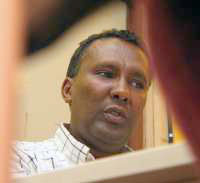Behind the continuing crisis in Sudan
Published Aug 12, 2005 10:44 PM
Sudan, by area, is Africa’s largest country. This Jan. 9, the
Sudanese government and the Sudan People’s Liber ation Movement, headed by
John Garang, signed a peace agreement that ended two decades of warfare between
north and south in which 1.5 million people are estimated to have died.
The pact gave the southern region autonomy during an interim
six-year period to be followed by a national referendum; agreed to split oil
revenues 50-50 between north and south; and established a new government of
national unity in which Garang would become first vice president of Sudan. The
agreement brought rejoicing throughout the country.
However, on
July 30, just three weeks after he took office, Garang was killed in a
helicopter crash in southern Sudan while returning from a meeting with the
president of Uganda, Yoweri Museveni. The helicopter belonged to
Museveni.
Garang’s death reopened the struggle, even though
the Sudanese government immediately announced that his deputy would
take over as vice president. Bloody fighting erupted in Khartoum
between police and partisans of Garang.
What are the
issues behind this struggle, and what role have the Western imperialist powers,
some of them former colonizers of the area, played in it?
In August
of 2004, as another crisis was developing in Darfur, a vast region in the west
of Sudan, the Belgian newspaper Solidaire interviewed Mohammed Hassan, a former
diplomat in Sudan’s neighbor, Ethiopia, about the situation in Sudan and
talk in the West about the need to intervene there for
“humanitarian” reasons. What follows are excerpts from that
interview a year ago.
In August 1998, the U.S. organized a war of
aggression against Congo, Sudan’s neighbor. They encouraged Rwanda to
invade Congo and provided it with weapons and military advisers. For the U.S.,
war was the only way to keep Congo in check. This war has made already 3.5
million direct and indirect civilian casualties. And now these very people who
instigated the war in Congo are showing concern for the humanitarian situation
in Sudan? Now they are incensed about the 10,000 deaths this conflict [in
Darfur] has caused?
U.S. imperialism has never had any humanitarian
concern and has never been disturbed by ethnic cleansing. The U.S. is taking
advantage of the dramatic situation in the western province of Darfur for its
own economic and political interest.
Sudan started to export oil in 1999.
Last year, revenues from export amounted to $1.2 billion and in 2005 this will
rise to an estimated $2 billion. The most important destination of this oil is
China. That is the real reason for the U.S. concern.
Britain conquered
Sudan at the end of the 19th century and added it to Egypt. From the very start
of the colonization, they made Sudan into a laboratory for their tactics of
“divide and rule.” The people have been saturated with racist
propaganda. All colonizers did that. Look at Rwanda and Burundi, where Belgium
was responsible for the rivalry between Hutus and Tutsis which has led to
several instances of genocide.
In Sudan, the British established an
administration on the basis of racism and ethnicism. According to these ideas,
the northern, brown, Arab Sudanese were superior to the black population in the
south because they were believed to be more similar to the European
“race.”
[The British] institutionalized these racist ideas:
the north of Sudan was separated administratively from the south—a form of
apartheid, in fact. The north was governed from Cairo in Egypt while the
south’s administration was based in Nairobi, Kenya. The British
established a system of “closed districts,” which means it was all
but impossible to travel from north to south. The age-old trade relations
between the north and the south were cut, destroying the traditional relations
between north and south.
In the north, the British allowed Islam and the
Arabic language, while they were forbidden in the south.
In the north, a
centralized administration was established with the help of young Sudanese
graduates from Egyptian univer sities. In the south, the British governors ruled
indiscriminately. Just like in Belgian Congo, the south’s education was
left to Christian missionaries who held the population mentally captive in the
Middle Ages.
On Jan. 1, 1956, the British chose to separate Sudan from
Egypt and reunite it again into one state. That was met with resistance from the
small elite in the south, as they were afraid to lose all power to the north.
At that time, the north was veering toward the anti-colonial policy of
Nasser in Egypt. Great Britain therefore supported the southern elite to rise up
against the north. Before the independence, civil war erupted between north and
south.
The country has been ravaged by civil war ever since, except for a
short interruption between 1972 and 1983. In 1983 the division gained the upper
hand again and war resumed. In April of this year, there was a new peace
agreement.
That is the history of the conflict. Those who are responsible
for ethnicism, the colonizers, would now like to intervene to save the country
from ethnicism. Isn’t it ironic? Africa belongs to the Africans. The 1972
and 2004 peace agreements were the work of the Sudanese themselves. Intervention
by the U.S. and Great Britain would mean greater dependence and a new form of
colonialism that would worsen the people’s sufferings. It would never be
able to liberate itself from social and economic poverty because it will lose
control of its natural resources.
Articles copyright 1995-2012 Workers World.
Verbatim copying and distribution of this entire article is permitted in any medium without royalty provided this notice is preserved.
Workers World, 55 W. 17 St., NY, NY 10011
Email:
[email protected]
Subscribe
[email protected]
Support independent news
DONATE


